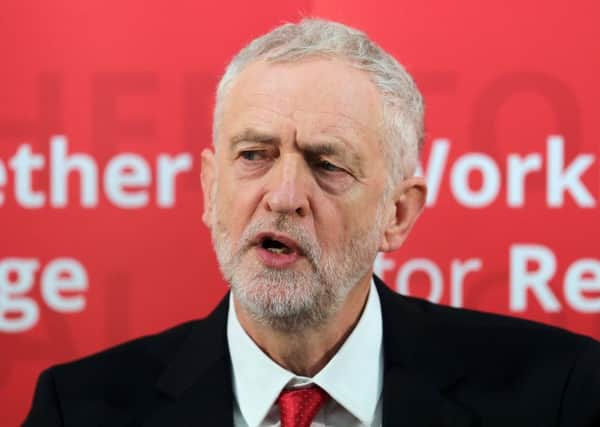Corbyn vows to speak up for the regions as he defends his leadership


Setting out his party’s wider vision for Brexit at a conference in London, the Labour leader blasted the Government’s failure to take the “anxieties and fears” felt by many regions seriously, and accused Theresa May of using the country as a “bargaining chip”.
But his message was marred by the loss of Labour’s long-held West Cumbrian seat of Copeland to the Conservatives - the first time an opposition party has lost a by-election to the governing party in more than 30 years.
Advertisement
Hide AdAdvertisement
Hide AdWhile many of Mr Corbyn’s usual critics were notably silent on the defeat – choosing instead to focus on the party’s victory over Ukip in Stoke – others warned of a “historic and catastrophic” defeat at the next general election if Mr Corbyn stays on.
Labour’s Copeland candidate, Gill Troughton, lost to Tory contender Trudy Harrison by 2,147 votes.
The constituency, which is home to the Sellafield nuclear power station, has been a Labour stronghold since it was formed in 1983.
Shadow Chancellor John McDonnell made an early attempt to leap to Mr Corbyn’s defence, blaming he defeat on party divisions and recent interventions by Tony Blair and Peter Mandelson.
Advertisement
Hide AdAdvertisement
Hide AdHowever, the claims were quickly dismissed by the Barrow and Furness MP John Woodcock, who described the result as a “disaster” and a sign the party is “in trouble”.
“We are actually on course to an historic and catastrophic defeat and that will have very serious consequences for the communities that we represent,” the MP told the BBC.
“I think it’s incumbent upon us who have expressed our views about Jeremy Corbyn in the past...to say how as a party are we falling short, how can we actually meet the needs of the country.”
Unite leadership hopeful Gerard Coyne also lamented the loss, claiming that the party was at “a pretty low ebb” and must ask itself “serious questions” ahead of preparation for 2020 elections.
Advertisement
Hide AdAdvertisement
Hide AdDave Prentis, general secretary of Unison, urged Mr Corbyn to “take responsibility” for turning the party’s fortunes around.
Richard Angell, director of the Blairite Labour group Progress, was more direct in his criticism. He suggested the party’s left-wing message was “repugnant” to voters and members should “rethink” its leadership.
But delivering his speech yesterday, Mr Corbyn denied outright any suggestion that he “could be the problem”.
The Islington MP expressed “disappointment” at the Copeland defeat, but maintained it was a case of the party failing to get its message across.
Advertisement
Hide AdAdvertisement
Hide AdHe went on to describe the Stoke result as a “decisive” victory over the “politics of nastiness and division” peddled by Ukip. And he stressed that the party would now step up efforts to “reconnect with our voters and supporters”.
“Yes I am disappointed by the result in Copeland and I pay tribute to our campaign there... [but] our party comes out of these elections utterly determined to get that message across,” he said,
“We are going to be out again tomorrow, and every other day, campaigning to get the message across of social justice in Britain.”
On Brexit, he acknowledged the difficulty many remain supporters in the party will have in accepting the country’s decision to leave the EU.
Advertisement
Hide AdAdvertisement
Hide AdBut he stressed the party will “rise to the democratic challenge” to put forward a “progressive vision” for Brexit which reflect the needs and concerns of a “broad range of voices”.
He also argued the Government has “failed to take seriously the anxieties and fears” felt by many regions, particularly at the prospect of losing millions of pounds worth of EU funding.
“Labour will be a voice for those regions, and we have demanded a clear Government plan on the future of regional funding,” he said,